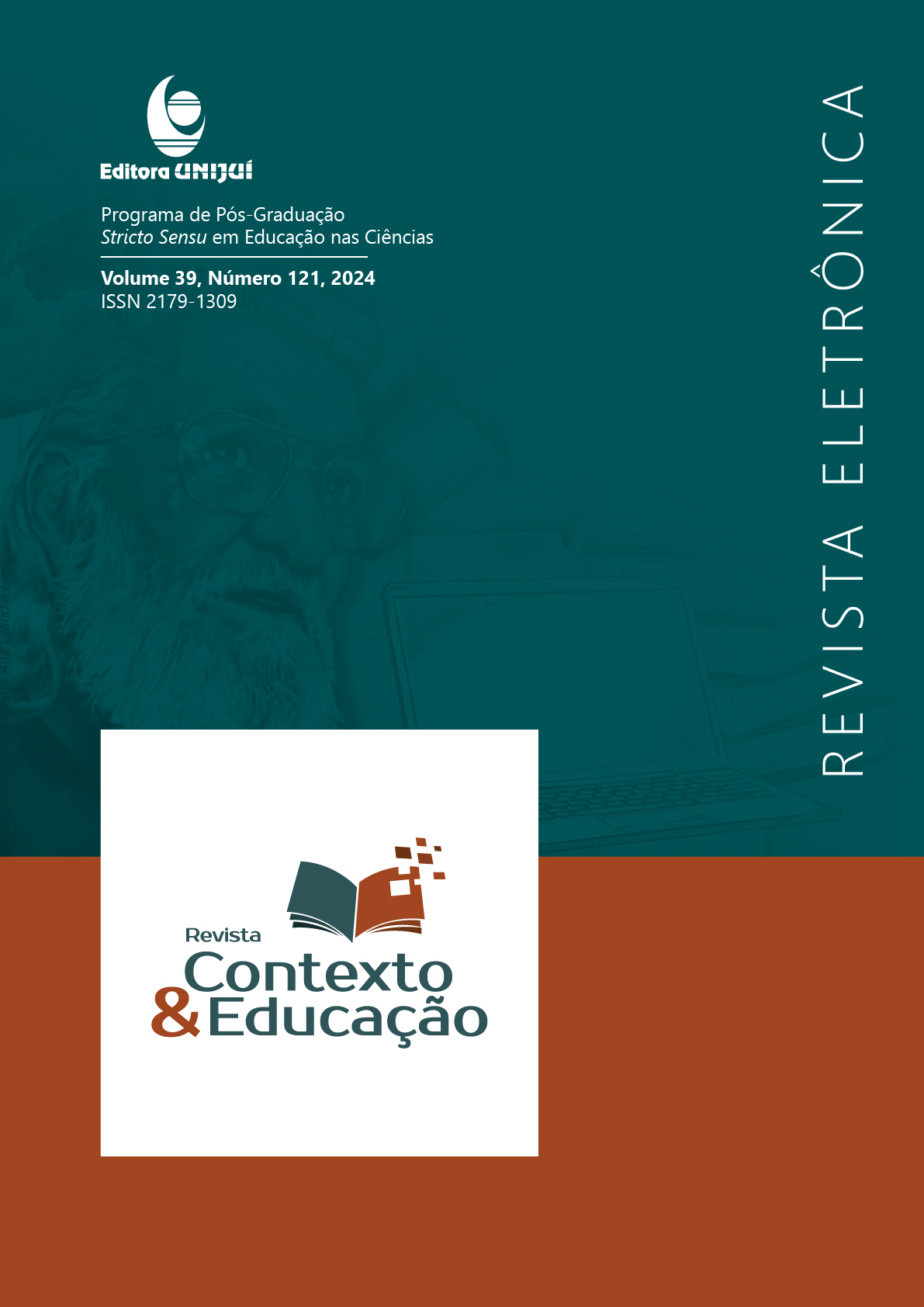Legal teaching and hermeneutics: Teacher understanding about the humanities
DOI:
https://doi.org/10.21527/2179-1309.2024.121.13866Keywords:
Teaching, Hermeneutics, Right, TeachersAbstract
This article presents, from a qualitative approach, the influence of the humanities and the understanding of the impacts of hermeneutic disciplines on legal education, based on perception, experience in the training trajectory and in teaching practice. The participants were chosen from the consultation of the Higher Education Institutions (HEI) website, constituting a corpus of six teachers, two from each HEI, one that teaches technical subjects and another humanistic. The interpretation of the responses to the questionnaire occurred through content analysis, in which the categories were interpreted: 1) Influence of humanistic disciplines on legal training; 2) Participation of humanistic disciplines in the curriculum of courses; 3) Student receptivity of humanistic disciplines. It was found that humanistic disciplines, in particular, those of a hermeneutic character, in addition to being a counterpoint to normative positivism, it envisions the possibility of critical-reflexive legal teaching, which promotes the conditions for understanding Law and the world of life.
References
ALVES, M. A. O modelo estrutural do jogo hermenêutico como fundamento filosófico da educação. Ciência e Educação (UNESP), v. 17, p. 235-248, 2011a. https://doi.org/10.1590/S1516-73132011000100015
ALVES, M. A. Interpretação e compreensão: da hermenêutica metodológica à experiência hermenêutica como crítica e fundamento do saber filosófico. Princípios (UFRN), v. 18, p. 181-198, 2011b. https://periodicos.ufrn.br/principios/article/view/17
BARDIN, Laurence. Análise de Conteúdo. Lisboa, Portugal; Edições 70, 2009.
BOLZAN DE MORAIS, J. L. As crises do Estado e da Constituição e a transformação espacial dos direitos humanos. Porto Alegre: Livraria do Advogado, 2002.
BRANCHER, V. R.; FORTES DE OLIVEIRA, V. M.; MIORANDO, T. M.; DREHMER-MARQUES, K. C. Práticas educativas e formação docente: ressignificando metodologias e saberes. Revista Contexto & Educação, [S. l.], v. 37, n. 116, p. 5–8, 2022. Disponível em: https://doi.org/10.21527/2179-1309.2022.116.12996
BRASIL. Lei nº 9.394, de 20 de dezembro de 1996. Estabelece as diretrizes e bases da educação nacional. Brasília, DF: Presidência da República.
BRASIL. Conselho Nacional de Educação. Resolução CNE/CES n. 5, de 17 de dezembro de 2018. Institui as Diretrizes Curriculares Nacionais do Curso de Graduação em Direito e dá outras providências. Diário Oficial da União, Brasília, DF, seção 1, p. 122, 18 dez. 2018.
DA SILVEIRA, V. O.; SANCHES, S. N. OAB recomenda: uma avaliação necessária. Revista Contexto & Educação, [S. l.], v. 30, n. 97, p. 138–159, 2016. Disponível em: https://doi.org/10.21527/2179-1309.2015.97.138-159
GABRICH, Frederico de Andrade. Transdisciplinaridade no ensino jurídico. In: RODRIGUES, H. W.; MEZZAROBA, O.; MOTTA, I. D. Direito, Educação, Ensino e Metodologia jurídicos. Florianópolis: CONPEDI, Fundação Boiteux, 2013, p.372-387.
GADAMER, H-G. Verdade e Método II – Complementos e índice. 2. ed. Petrópolis: Vozes, 2002.
HUPFFER, H. M. Ensino Jurídico: um novo caminho a partir da hermenêutica filosófica. Viamão, RS: Entremeios, 2008.
LIBÂNEO, J. C. Didática. São Paulo: Cortez, 1994.
MACHADO, A. A. Ensino jurídico e mudança social. 2. ed. São Paulo: Expressão Popular, 2009.
MORIN, E. A cabeça bem-feita: repensar a reforma, reformar o pensamento. Rio de Janeiro: Bertrand Brasil, 2000.
MINAYO, M. C. S. (Org.). Pesquisa social: teoria, método e criatividade. Petrópolis: Vozes, 2001.
NUSSBAUM, M. Sem fins lucrativos: por que a democracia precisa das humanidades. São Paulo: Martins Fontes, 2015.
PETRY, A. T. Repensando o ensino jurídico brasileiro a partir do seu berço: a faculdade de direito de Coimbra. In: PETRY, A. T.; MIGLIAVACCA, C.; OSÓRIO, F.; DANILEVICZ, I.; FUHRMANN, I. R. (org.). Ensino Jurídico no Brasil: 190 anos de história e desafios. Porto Alegre: OAB/RS, 2017, p. 64-91.
SOUZA SANTOS, B. S. Para uma revolução democrática da justiça. 3. ed. São Paulo: Cortez, 2011.
SILVEIRA, M. N. Ensino Jurídico: um convite à (re)leitura nos caminhos da filosofia do conhecimento. Raízes Jurídicas, v. 3, n.1, p. 87-114, 2007.
STRECK, L. Lições de crítica hermenêutica do direito. Porto Alegre, RS: Livraria do Advogado Editora, 2016.
WARAT, L. A. Saber Crítico e Senso Comum Teórico dos Juristas. Revista Sequência, v. 3, n. 5, 1982.
YIN, R. Estudo de caso: planejamento e métodos. Porto Alegre: BooKman, 2001.
Downloads
Published
How to Cite
Issue
Section
License
Copyright (c) 2024 Revista Contexto & Educação

This work is licensed under a Creative Commons Attribution 4.0 International License.
By publishing in Revista Contexto & Educação, authors agree to the following terms:
All works are published under the Creative Commons Attribution 4.0 International License (CC BY 4.0), which allows:
Sharing — to copy and redistribute the material in any medium or format;
Adaptation — to remix, transform, and build upon the material for any purpose, even commercially.
These permissions are irrevocable, provided that the following terms are respected:
Attribution — authors must be properly credited, a link to the license must be provided, and any changes made must be indicated.
No additional restrictions — no legal or technological measures may be applied that legally restrict others from doing anything the license permits.
Notices:
The license does not apply to elements that are in the public domain or covered by legal exceptions.
The license does not grant all necessary rights for specific uses (e.g., image rights, privacy, or moral rights).
The journal is not responsible for the opinions expressed in the articles, which are the sole responsibility of the authors. The Editor, with the support of the Editorial Board, reserves the right to suggest or request modifications when necessary.
Only original scientific articles presenting research results of interest that have not been previously published or simultaneously submitted to another journal with the same purpose will be accepted.
Mentions of trademarks or specific products are intended solely for identification purposes and do not imply any promotional relationship by the authors or the journal.
License Agreement (for articles published from October 2025): Authors retain the copyright to their article and grant Revista Contexto & Educação the right of first publication.


